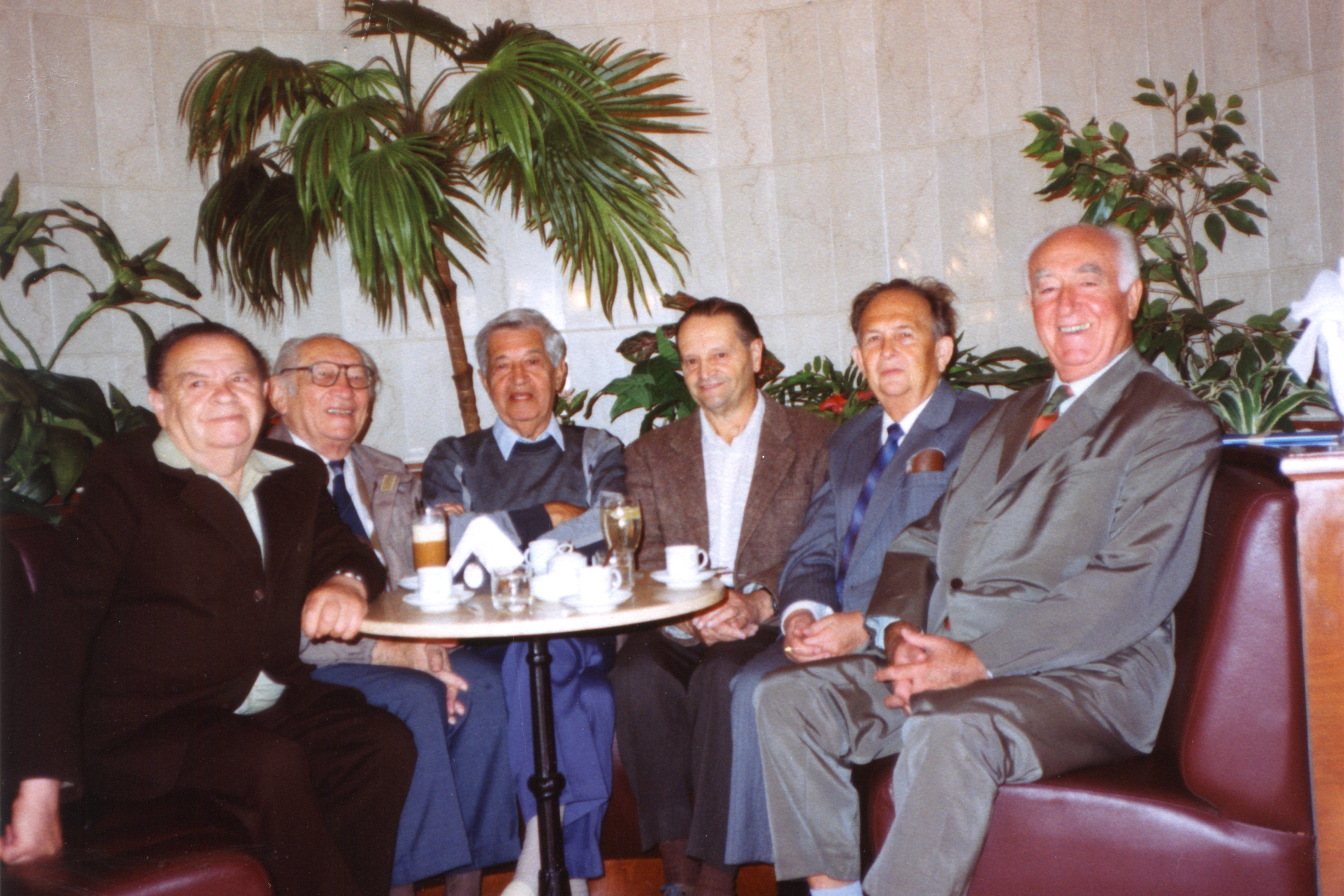Reunion of former members of the Sixth Labor Battalion
This photo shows the reunion of some of the members of the Sixth Labor Battalion at the Forum Hotel in Bratislava. I am the first one on the right. Sitting on my right is Durko (Juraj) Lackovic, named Lefkovic before the war. Sitting beside him is Dr. Ferko Chorvat. He also changed his name, I don't remember what it was before anymore. Next is Pelach, who used to be named Politzer. He was one of the doctors in the Sixth Battalion, otherwise a very wise person. He spoke many languages. The next is Pazeriny, and the first on the left was named Hercka, that's of course his changed name. I don't remember his original name either.
As I've already mentioned, during the time of the Slovak State, we were members of the Sixth Battalion. After the war many of us moved away. The emigrants kept in touch with each other. In Tel Aviv they met every Friday, and they even had two worldwide gatherings. We who stayed here were isolated and didn't dare to meet publicly. Among us there were even those that denied being in the Sixth Battalion. After the Velvet Revolution, emigrants began to visit our spas and so we established contact with them.
In 1992 we finally managed to get a few boys from the Sixth Battalion together. It was due to the impetus and money of one of us, a friend from the USA, by the name of Pivko, originally Pick. Besides the fact that he was rich, he had an excellent Jewish heart. With his money, we were able to support boys that were badly off, and widows of Sixth Battalion members that were in financial need. We also organized a reunion in Czechoslovakia, with many international participants, with his money. The reunion took place in 1992 in Piestany. Other conferences and reunions were in Bratislava. Within the scope of Sixth Battalion activities, in twelve years we did a lot of work in the interests of Sixth Battalion members and their widows. With the participation of many prominent Slovak historians and resistance members, we filled in many blank spots in the history of the creation, existence and dissolution of the Sixth Jewish Labor Battalion. In this way we also helped to bring to light part of Slovakia's history. We also documented the participation of Jewish boys in the resistance, as well as how many of them fell. We gained valuable materials from military archives.
I was chairman of the Sixth Battalion for the entire twelve years. This was only possible because my wife helped me the entire time as well. Unfortunately our ranks are shrinking and now basically only my friend Bachnar, the widow Mrs. Borska and I devote ourselves to the Sixth Battalion. With the remnants of the money that we have, we'd like to have one more memorial plaque made, which we'd then have placed on Kozia Street in the building of the Central Federation of Jewish Religious Communities or in the building of the Museum of Jewish Culture in Bratislava. The first memorial plaque is in the Museum of the Slovak National Uprising in Banska Bystrica.
We wanted to succeed in having our being put in the Sixth Battalion recognized by the state as a stay in a labor camp. Government representatives were very much against it. For a long time they refused to accept this idea from the Central Federation of Jewish Religious Communities, until we with great vehemence joined the effort, then things began moving. At a meeting with the Minister of Justice, Lipsic, we presented this request. Lipsic [Lipschitz] is originally from a Jewish family, but doesn't admit to it. Finally, making use of documents from military archives, we managed to have ourselves put into a category that despite not having been in a concentration camp also got satisfaction in the form of compensation. Of assistance in this was a clause in the law which states that 'also those, who were prepared for transport, and who were known to be going there,' were also eligible for compensation, so we were also classified as such. The widows of our friends that hadn't lived to receive it were also classified in this category.
Basically, we can thank the then minister of defense, General Catlos, that the entire Sixth Battalion didn't end up in a concentration camp in 1942. He announced at the request of the Minister of the Interior of the Slovak State that the Sixth Battalion should be prepared for deportation, that the Sixth Battalion will go as the last transport of Jews from Slovakia. But that didn't happen, they didn't get to it! Luckily for us!
